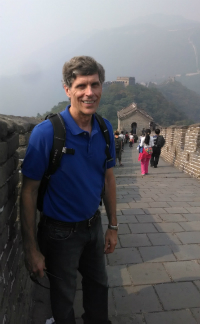
What made this study abroad experience unique and special?
Jim: Studying with KCE in Shijiazhuang (SJZ) is a great way to learn Mandarin quickly. The two teacher with whom I worked were excellent. Both had bachelors degrees, understood the subject matter in depth, and were very experienced and capable teachers. In SJZ, very few people speak English, and, other than your fellow KCE students, there are very few non-Chinese.
As a result, you are immersed and using your language skills frequently. In SJZ, they use a very standard Mandarin, which means what you are learning in class is what you will use on the street. This is not true in many other places. Perhaps one of the best aspects is the one-on-one teaching. It makes a huge difference versus being in a class of 4 or 5.
Tell us about an experience you had that you could not have had at home.
Jim: The immersion aspect is a huge difference in learning Chinese. In my US class, I go once a week, and don’t use Chinese in conversation until the next class. In SJZ, you have to use Chinese in conversation all day every day. Using it in living you life day to day not only speeds up the learning, but embeds the learning much deeper as you try to use it, make mistakes, use it again, and succeed.
What did KCE do for you and what did you need to do on your own?
Jim: All the staff at KCE were helpful, not just in class, but in dealing with everyday issues such as going with you to buy a train ticket or set up cell phone service. When my bicycle broke, I prepared by learning the works for handlebar, screw, tighten, etc, but my teacher came with me to back me up as I talked with the repair man.
If not doing a homestay, they will help you find restaurants or the closest grocery stores. With a homestay, KCE will get you set up and show you how to use the very good bus system. KCE will help you with pretty much anything you need help with, but they encourage you to take the lead to maximize you learning.
Describe your program socially and academically.
Jim: The program is tailored to the level of proficiency of each student. The teachers do a good job of quickly assessing where you are and starting you in an appropriate program. With one-on-one, you get great personal attention, but it also means that you need to do your work each day because it will be obvious when you don’t. As a result, however, you can make rapid progress.
The one-on-one is also very good for working on pronunciation. I had been in a 5 person class before, and with other students doing the speaking repetition with you, it is difficult for the teacher to pick up pronunciation mistakes for each of the students.
With just one student, it is obvious when you are off, and they can correct you quickly. I wish I had done this when I started because I had to undo some of the bad habits I had picked up in my prior studies.
Socially, there were lots of chances to go out in the evenings with other students, and a few times some of the teachers took some students to a favorite place to eat. The night market was a fun time with probably 100 food vendors in small booths with large number of fantastic foods that I had never seen or tasted before.
Describe your favorite must-have food that you tried abroad.
Jim: My favorite was jiaozi, which are called dumplings or pot stickers in the US. When freshly made by hand and served right after steaming, they are delicious. However, the most interesting thing I had was what the other students called “donkey burgers”.
Early in my stay, a group of students was going out that evening and asked me along to eat donkey burgers. I figured they had made up the name for some unusual food they had found. After we ordered and started eating this pita like sandwich with meat and peppers, I asked what was in it. It really was donkey.
After being in China a while, you realize that they eat a lot of things that are very different from what you would find in the US, and this type of thing would not have surprised me after I had been there a while.